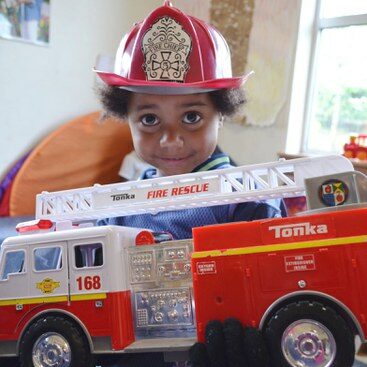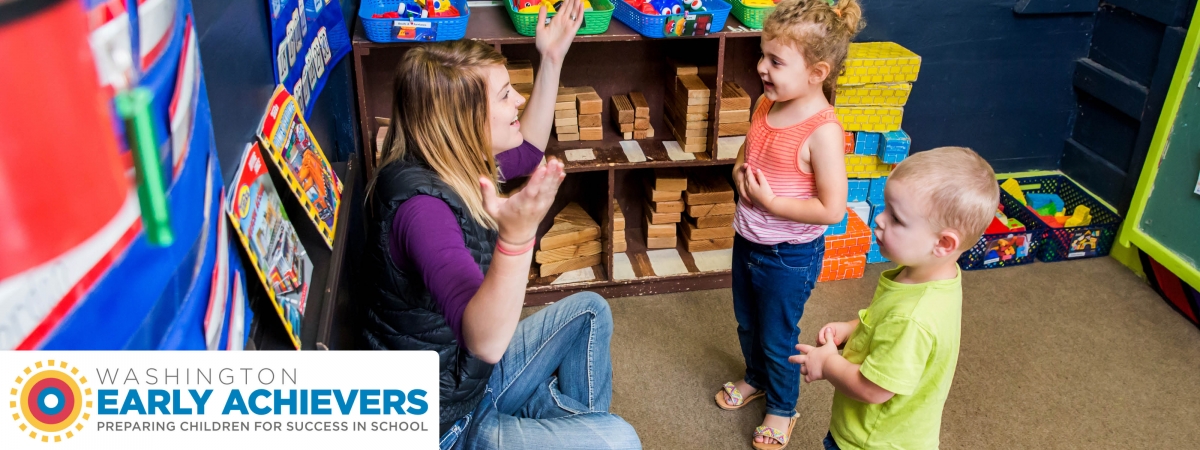Free Child Care Referrals
Choosing child care is one of the most important decisions families make. The Child Care Aware of Washington Family Center can help. Call them to find high-quality child care that best meets your family’s needs. These are free child care referrals. Call 800-446-1114, Monday through Friday from 8:30am – 4:30pm for your detailed report. Parents may also access their own search online, 24-hours a day by clicking here.
Referencias de cuidado infantil gratuitas
Child Care Aware of Washington le ayuda a encontrar cuidado infantil de alta calidad y con licenciatura cerca de usted. Utilice nuestra herramienta de búsqueda por medio del Internet o llame a nuestro Centro Familiar, de lunes a viernes entre 8:30 am y 4:30 pm. Nuestros expertos en cuidado infantil están listos para ayudar. Servimos a familias en más de 250 idiomas sin costo. Llame al centro familiar, 1-800-446-1114. Busqueda online.
Six steps for finding quality child care
1. Make a list of considerations, taking time to prioritize needs and wishes
- Do you want child care that is close to home, close to work or both?
- What time do you need child care? Do you need part-time or full-time?
- How much can you afford to pay for child care?
- Does your child have special needs that need to be considered?
- Do you want a child care with lots of outdoor play activities?
- Do you want a child care that has a preschool curriculum?
2. Consider child care options
Now that you have identified some your family’s child care needs, you can consider what types of child care programs may be the best fit. The costs, advantages and disadvantages vary, so make a list or chart that keeps track of pros, cons, costs, and other notes as you begin to consider all of the options. Your options include:
- Licensed child care – Minimum licensing requirements are established by the Department of Child, Youth and Families (DCYF). Teachers must meet educational requirements. Authorized to accept Working Connections. Review licensing requirements, find out if a provider is licensed, or get complaint history at DCYF’s Child Care Check website: https://www.findchildcarewa.org or call 866-482-4325.
- Head Start and Early Childhood Education and Assistance Program (ECEAP) – Income level and a child’s age determine eligibility for preschool. Early Head Start is also available for low-income children from ages 0-3, and for pregnant women. For Thurston, Mason, and Grays Harbor residents, find out if you are eligible or to apply at Sound to Harbor Head Start/ECEAP at 360-464-6800. Other areas, please visit the Washington State Association of Head Start & ECEAP directory.
- Private preschools – Provide an educational program four or less hours per day for children ages 3-5. Not required to be licensed. Typically part-time and require private pay.
- Parent cooperative preschool programs – Typically part-time for children ages 3-5 and provided through community colleges. Not required to be licensed. Requires parents to volunteer time and participate in parent education. Not authorized to accept Working Connections.
- Family, friend or neighbors – Not required to get licensed. May be more flexible, less expensive, and less stable. Working Connections will pay a relative caregiver when they register and pass a criminal history check.
- Nanny’s – Not required to get licensed. Not authorized to accept Working Connections.
3. Contact Child Care Aware of Washington Family Center referral specialists
Child Care Referral Specialists at the Child Care Aware of Washington Family Call Center can refer you to child care centers, family child care homes, preschools or school age programs. They can give you a list of providers that meet the needs you have outlined in step one. You can either call them at 800-446-1114 or start your online search by clicking here.
4. Research child care providers
Once you have a list of potential providers, it is time to begin researching those options. When looking for child care, be aware of the following indicators: group size, health and safety, provider education and turnover rate, accreditation, ratios, and family involvement. It is best to start with an initial phone call screening, and follow up with a couple visits. Consider visiting once by yourself, to observe the setting and activities your child will be in, and then make another drop-in visit with your child. Once you have visited specific child care providers, you should check the licensing history and complaint file for the provider or center at the DCYF or call 1-866-482-4325.
5. Initiate your new child care plan
Once you have selected a child care arrangement, prepare yourself and your child to begin child care. During the first few weeks, discuss the transition with your child and the caregiver. Arrange several short visits, if possible, before you leave your child all day. Experienced caregivers know how to help both children and parents through the transition of good-byes, especially the first few times.
6. Stay Involved
Remember, it is up to you to monitor the child care program you have chosen and to talk with your child’s caregivers about how your child is getting along. Caregivers need your support and appreciation for their good work and children need parents to constantly evaluate the child care arrangement. Your child or family’s needs may change over time.
Ways to stay involved and keep a good relationship with your provider:
- Stay as close as you can to your arrival times. Call and make necessary arrangements if you are going to be late. It’s courteous to your provider and makes your child feel more secure.
- Get to know other parents of children who are cared for by your provider. Talk to them about their experience.
- Ask questions if something is happening that you don’t understand.
- Drop in frequently and participate in daily activities.
- Ask your child what he does during the day. Find out how he interacts with the caregiver.
- Spend a few minutes each day talking with caregiver about your child.
- Ask your provider what training and education she has completed. Providers take pride in their knowledge about child development, and they can be a resource for you in helping your child succeed.
If you suspect a child has been neglected or abused, call 1.866.ENDHARM (1.866.363.4276). This is Washington’s toll-free, 24/7 hotline.

Licensing Requirements
Some basic requirements are but not limited to:
- Criminal Background check
- First Aid/CPR/HIV/AIDS/Blood Borne Pathogens training
- 30 hours of basic child care training (Lead Staff)
- An inspection for health and safety for facility
- Current Tb (Tuberculosis) test
Staff and Ratios
Please visit https://bit.ly/2s5Bbrl for more information.
Complaints
- File a complaint: If you have any concerns about a provider please call CPS (Child Protective Services) at 1-800-562-5624.
- Child Care Check provides information on complaints on a provider. Access this information at 866-482-4325 or their website at https://www.findchildcarewa.org.
- We do not guarantee the quality of the providers in our database. We urge you to interview and check references before leaving your child in care.
Is your family experiencing homelessness?
Families who are experiencing homelessness can access child care subsidies through the Working Connections Child Care (WCCC) program. To obtain assistance in applying for the WCCC program, Child Care Aware of Washington (CCA of WA) is the go-to resource for families. Call CCA of WA Family Line toll free at 1-800-446-1114 and select an option in the phone tree that will transfer them to the homeless call center experts or visit their website.
Families can also contact the Department of Social and Health Services directly to apply for WCCC at 1-877-501-2233.
¿Qué sucede con las familias que no tienen dónde vivir?
Ayudamos a las familias con niños pequeños que están experimentando la falta de vivienda encontrar cuidado de niños sin costo alguno para ellos hasta por cuatro meses. El cuidado infantil ofrece a los niños pequeños que experimentan la falta de vivienda un lugar seguro para jugar y aprender, comida sana y la oportunidad de hacer amigos. La falta de vivienda no es negligencia y los servicios de protección infantil (CPS) no le quitarán a su hijo porque usted no tiene hogar. Haga clic aquí para obtener más información sobre este programa.
What is Early Achievers?
Early Achievers is Washington’s Quality Rating and Improvement System (QRIS) that gives parents the resources they need to make an informed choice on choosing a child care provider. The rating system of 1-5 is an objective measure based on observable elements of quality. In addition, it offers providers at every level professional support and coaching to continually improve the quality of care at no cost to them or to the parent.
For help in choosing high quality childcare sites participating in Early Achievers:
Frequently Asked Questions
Where can I find help paying for child care?
Working Connections Child Care is a state program that helps families with children pay for child care while they work, look for work or are in a state-approved training. Families with incomes under 200 percent of the Federal Poverty Level qualify. Parents who receive a subsidy help pay for child care services with a co-payment that depends on family size and income.
Find out more about Working Connections or apply
The Department of Children, Youth, and Families oversees the Early Childhood Education and Assistance Program (ECEAP), a preschool program designed to help low-income and at-risk children and their families succeed in school and life. Four and three-year-old children and their families that are at 110 percent of the Federal Poverty Level are eligible. This includes families receiving public assistance, children in the foster care system and parents with limited incomes who are working or in school.
How do I check on a provider’s license and complaint history?
The Department of Children, Youth, and Families Child Care Check helps parents and others find general licensing information and complaints about licensed child care providers and facilities. Call 866-482-4325 or Use the Licensed Child Care Check tool
What if my child has special needs?
Most children, including those with disabilities and special needs, spend some time in a child care environment. In a quality child care environment, caregivers respond positively to differences in children’s abilities, interests and experiences. Our child care provider professional development academy offers free classes on working with children with special needs. CCAC also provides onsite consultation to parents and providers to assist in creating a relationship and an environment where your child will succeed and be happy. CCAC encourages child care providers to accept children with special needs and keeps track of providers that have education and experience working with children with special needs. Let us know if your child has special needs of any kind. The Family Center’s trained Resource & Referral specialists will provide you with and enhanced search to assist you in finding a child care that can meet your needs. Call 1- 800-446-1114.
Additionally, our community partners, South Sound Parent to Parent and Arc of Washington State provide support for families including a child with special needs.
What if I have concerns about my child care provider or facility?
You can play an important role in the ongoing monitoring of licensed child care and school age care programs. To inquire about a specific licensed program, discuss concerns, or file a complaint, call the Licensed Child Care Check Information Line at 866-482-4325.
